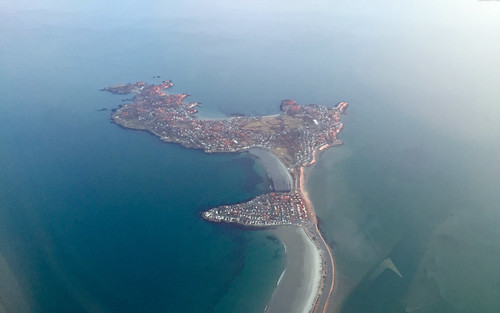isthmus /IS-thməs/. noun. A strip of land with water on both sides that connects two relatively larger land areas. In anatomy, a narrow part or organ connecting two larger parts. From Latin isthmus, from Greek isthmos (narrow land between two seas). Further history is unknown, though it could be from eimi (to go) and suffix -thmo (step, movement).
“They journeyed by canoe as far as the Chagres River would take them, then onward by mule. The isthmus, a thin, serpentine twist on the map, became five days’ journey through a stinging, biting fog.” (Alissa York)
“There was of course her figure to be assimilated; and only the most vicious corset, he thought at first, could so constrain the isthmus of her waist.” (Martin Amis)
“She sat on the sand and put her shapely foot in his lap, oblivious to the fact that she was exposing the metallic-gold isthmus of thong bikini between her legs, or that her pumiced heel was pressing down on his groin.” (Tatjana Soli)
“Increasingly these days, he feels the need, deep in his limbic knot, to revert to that cure-all of his surgeon forebears: Open the vein. Primitive debridement. Let the infested fluid drain. Bleed this body, too long under pressure. Cut a counterflow, run a detour down that privileged, gerrymandered isthmus straight into the marina. Trust to the Golden State rule: cars will head toward any empty space.” (Richard Powers)
“…at a certain point one stands on the isthmus and sees clearly the Atlantic and Pacific of life. There is the destiny of going one way or the other and you must choose.” (Samuel Beckett)




